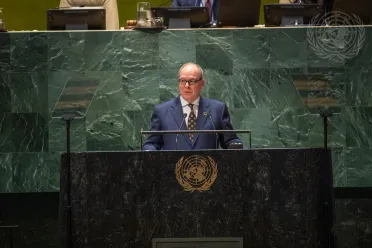Statement
Statement summary
ALBERT II, Sovereign Prince of Monaco, noted that respect for the environment and wildlife on land and at sea, and support for science have been fundamental priorities for the Princes of Monaco throughout the centuries. “Today, what was a relentless unfailing commitment has become a duty for our survival,” he stressed — which is why Monaco signed the United Nations Framework Convention on Climate Change, the Convention on Biological Diversity and that on the fight against desertification. Among Indigenous or island peoples, the sea is a being in its own right, he recalled, stressing that the international community must not waste another moment: “extreme climatic events” are already causing the suffering of millions of people and require urgent action. Acidification of the ocean and the rise in sea level are phenomena that constitute threats to the very existence of coastal communities in many countries.
Therefore, the international community must seize the opportunity to correct the trajectory in order to limit global warming to 1.5°C — requiring profound and sometimes difficult changes to lifestyles and collective organizations. His Government will contribute €3.3 million to the reconstitution of the Green Climate Fund for 2024-2027, an increase of 10 per cent compared to the previous period, while Monaco is already the first donor per capita. He noted that major achievement in outer space should be accomplished for the oceans; while countries are looking for the presence of water on the planet Mars, it took a generation for the United Nations to hold a new International Conference on Climate and Water
last March. The youth of all countries place before the United Nations a crucial responsibility: ensuring the preservation of the air they breathe, the earth upon which they grow, and the seas and oceans which are the cradle of humanity and the key to its survival.
He further recalled that conflicts also seriously damage the environment and represent an additional obstacle to the achievement of the Goals. It has been almost 600 days since Moscow made the decision, in violation of international law, to launch large-scale aggression against Ukraine. As in all conflicts, fighting and bombings pollute soil and water with toxic substances; protected natural areas have been destroyed, and damage to critical infrastructure increases the risk of polluted drinking water and the spread of disease. Likewise, he expressed alarm that in the twenty-first century, health-care personnel are regularly attacked, and health infrastructures are attacked in different conflict zones. Reiterating the call for the protection of these professionals and civilian populations, he urged the international community to learn from the experiences of the COVID-19 pandemic to strengthen global governance and build strong and resilient health-care systems.
Emphasizing that the quest for innovation is inherent to human nature, he said it deserves support when it is “geared towards improving the lives of our people”. Although fascinated by the benefits of digital technologies that simplify daily lives, the international community cannot neglect their dangers. artificial intelligence often proves to be more efficient and reliable than humans in many tasks; however, “it can be the language of Aesop” — both the best and the worst things for humankind. Cyberattacks using artificial intelligence are already targeting critical infrastructure like hospitals and United Nations humanitarian aid operations, while the security and arms industry exploit these techniques, raising potential ethical problems: can humanity let a machine decide on the life or death of a human being? He therefore welcomed all efforts aimed at developing a high-level advisory body within the United Nations to work on the international governance of artificial intelligence.
Full statement
Read the full statement, in PDF format.
Photo

Previous sessions
Access the statements from previous sessions.
